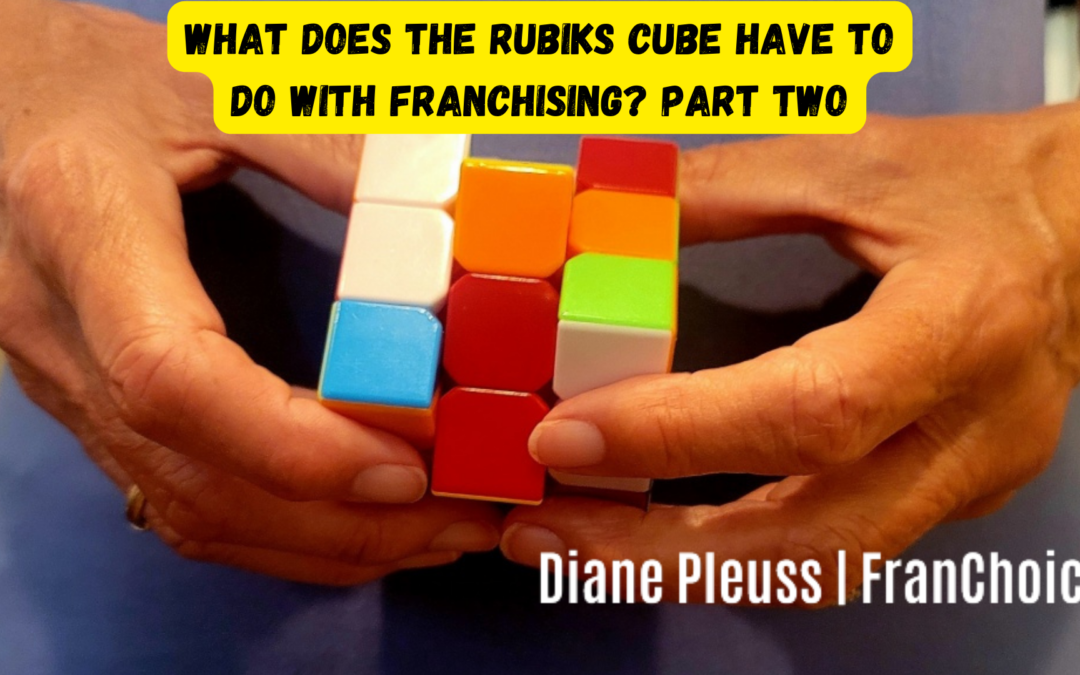What does the Rubik’s Cube have to do with franchising?
Some people love puzzles, like the Rubik’s Cube. I’m more of a crossword fan, but I appreciate the complexity of the Rubik’s Cube. Now my brother, who is an engineer, is a wiz maybe because of the way his mind works. For anyone who might be wondering, the Rubik’s Cube is that 3-D combination mechanical puzzle made up of primary-colored squares.
Originally invented in 1974 by Hungarian sculptor and professor of architecture Ernő Rubik, the puzzle combines art, math, and science, to tease the brain with challenges to develop problem-solving skills. It is considered one of the world’s most popular toys and is listed as one of the 100 most influential inventions during the 20th century (Inventing the 20th Century: 100 Inventions That Shaped the World, by V D Stephan, New York: New York University Press, 2002.)
The Rubik’s Cube has generated studies with the research and application indicating it is not only an intellectual toy. It’s transformed from a toy to a research object to an object of significance in multidisciplinary research.
As with any great invention, the years roll by, and someone, somewhere decides to improve upon its design and operation. Today, there are several versions of the Rubik’s Cube. The newer versions with touch sensitive lighting, rounded edges to the squares and easier manipulation in general are considered good advances. All this to say, good ideas often get better with age.
The same could be said of franchising.
As a franchise consultant, I see analogies to franchising. Initially people spent hours trying puzzle out the Rubik’s Cube. Some people who mastered it, wrote a book about it. Then others improved the cube so it’s easier to manipulate. Isn’t that like business ownership? The people who solved the original Rubik’s Cube are like the independent businesspeople, figuring it out through trial and error. Then someone writes a book. Kind of like the creation of a franchise company. Then someone improves on the cube, similar to the process of a franchise company refining systems.
When businesspeople come together to work on best practices, they often get better. When someone considers going into business, they may be drawn to a franchise because so many of the kinks in systems have already been worked out. You don’t have to start from scratch. You have a solid business model and proven systems to start your journey. That alone can put you years ahead of your competition.
If you’d like to find out other advantages of a franchise, contact me today at 925.642.9976. If you want to get better as puzzles, ask my brother…
How is a Rubik’s Cube like franchising?
Recently, I wrote about how the Rubik’s Cube and franchising may seem like two completely unrelated concepts, but I see some interesting similarities between them. The Rubik’s Cube has evolved from a toy to a research object to an object of significance in multidisciplinary research. Today, there are several versions of the Rubik’s Cube, each enhanced with new features from what went before. All this to say, good ideas often get better with age. The same could be said of franchising.
So, what do a Rubik’s Cube and franchising have in common?
- Standardization: Solving the puzzle of the Rubik’s Cube is done in steps. The rules for solving the puzzle are the same for every cube. Franchising provides a standardized set of services, products and systems. As a franchisee you are expected to follow a set of standard procedures and guidelines developed by your franchisor.
- Consistency: Solving a Rubik’s Cube, requires you to follow a systematic sequence of moves in a consistent manner. Franchising requires consistency if you are going to maintain a strong brand identity while providing customers with a consistent experience across different franchise locations.
- Complexity: To solve a Rubik’s Cube you take on a complex and challenging task. You’ll need a combination of persistence, logic and creativity. The same is true of owning and operating a franchise. Your work can be complex and will often include a range of skills and knowledge in areas such as marketing, finance, and operations.
- Flexibility: While there is a standard method for solving a Rubik’s Cube, different algorithms and techniques can be used to achieve the same result. Similarly, within the framework established by the franchisor, franchising allows for some degree of flexibility and customization.
If you’d like to find out other advantages of a franchise, contact me today at 925.642.9976.

